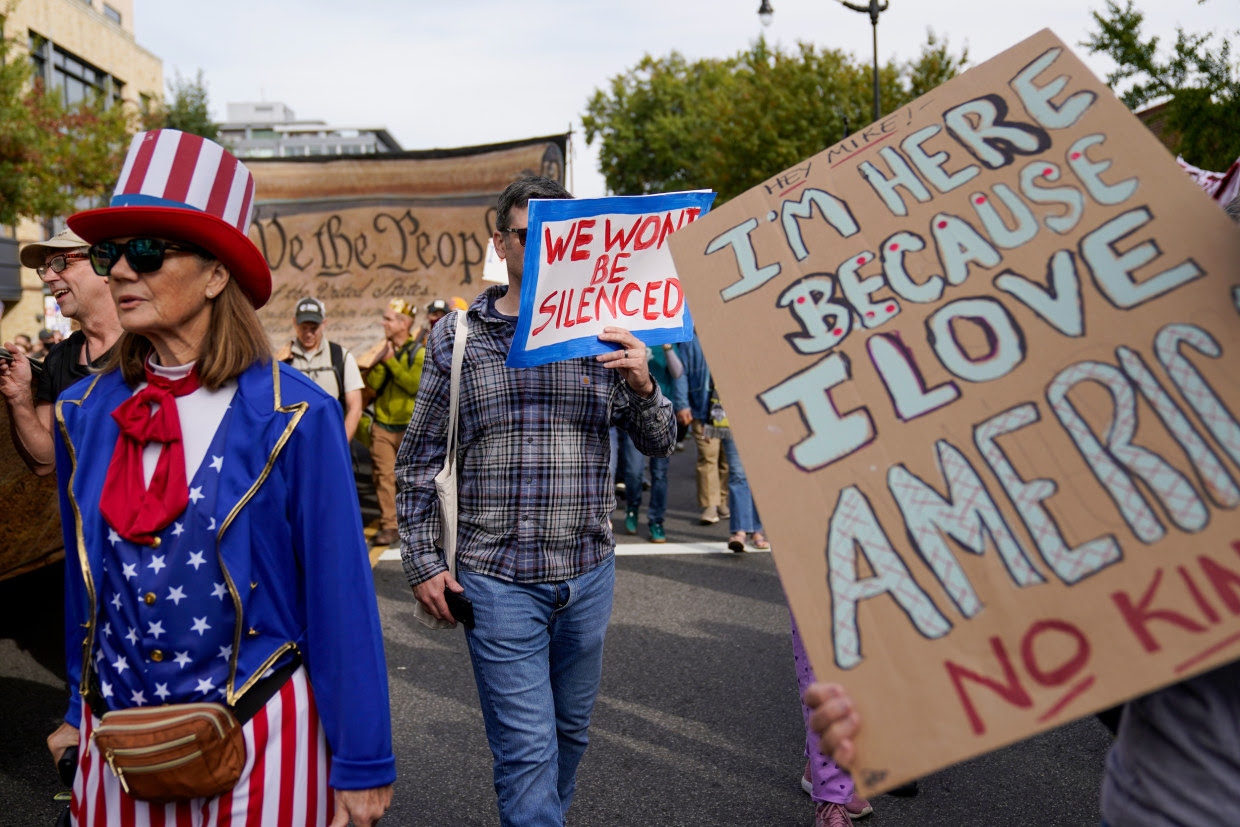WASHINGTON / NEW YORK — As thousands marched in the “No Kings” demonstrations across the country on Saturday, Republican leaders who previously condemned the movement were largely silent — a notable contrast to their earlier attempts to paint the protests as anti-American and extremist.
The rallies, held in dozens of cities, took on a festive public tone rather than a confrontational one. Marching bands, oversized banners quoting the preamble of the Constitution, and inflatable costumes — especially the now-iconic protest frogs — became the dominant visuals instead of the unrest some conservatives had warned about.
Only a handful of prominent Republicans, including Donald Trump, JD Vance, and Fox News contributors, commented publicly before or around the time of the demonstrations, while most of the party’s senior figures held back from live criticism as the events unfolded.
Trump Pushes Back on ‘King’ Label
In a Fox News interview on Friday, Trump responded to the protest theme directly.
“They say they’re referring to me as a king. I’m not a king,” he said, distancing himself from the monarchy metaphor used by organizers to criticize what they view as authoritarian tendencies.
At a White House event earlier in the week, Trump had tried to downplay the demonstrations altogether. “I hear very few people are going to be there,” he said. With no official travel schedule, the former president spent the weekend at his Mar-a-Lago estate in Florida.
Despite his earlier rhetoric, Trump made no real-time remarks Saturday as the events picked up national attention.
Vance and Hegseth Attend Military Showcase in California
In what some saw as conservative counter-programming, Ohio Sen. JD Vance and Defense Secretary Pete Hegseth attended a live-fire amphibious capabilities demonstration at Camp Pendleton in California. The event commemorated the 250th anniversary of the U.S. Marine Corps and appeared designed to draw media attention away from the protests.
However, the plan to fire artillery shells over a highway near the base triggered objections from Democratic Gov. Gavin Newsom. He criticized the move after the California Highway Patrol was forced to temporarily shut down part of a major interstate.
“The President is putting his ego over responsibility with this disregard for public safety,” Newsom said in a statement. “Firing live rounds over a busy highway isn’t just wrong — it’s dangerous.”
Online Attacks Continue Despite On-the-Ground Calm
Even as most Republican figures refrained from live commentary, Vance took to social media to go after New York Democratic mayoral candidate Zohran Mamdani. Vance accused Democrats of hypocrisy for meeting with Siraj Wahhaj, an imam once listed as an unindicted co-conspirator in the 1993 World Trade Center bombing case.
“I’ve been reliably informed that Democrats are opposed to any kind of political violence,” Vance wrote on X. “So I look forward to them universally condemning Zohran Mamdani for campaigning with an unindicted co-conspirator in a terrorist plot that killed 6 New Yorkers.”
Meanwhile, Fox News aired reports claiming that organizers tied to “global intifada” and anti-Israel activism had joined the New York protests under banners like “UAW Labor for Palestine” and “NYC Labor for Palestine.” The network also asserted that groups connected to George Soros had funneled $3 million to Indivisible, one of the protest coalitions, alleging the money was meant to support “social welfare activities.”
Organizers of the rallies dismissed those allegations as recycled conspiracy theories aimed at delegitimizing the movement.
Sharp Contrast From Last Week’s Republican Warnings
The relative quiet from GOP leaders Saturday marked a shift from their language in the days leading up to the protests.
Last week, House Speaker Mike Johnson referred to the upcoming demonstrations as a “hate America rally.” He urged conservatives to “watch who shows up,” listing “Marxists,” “antifa types,” and “people who hate capitalism.” Other Republicans argued that Democrats were postponing a deal to reopen the government — now in its 18th day of shutdown — because of their interest in the protests.
Some conservative figures also accused Senate Minority Leader Chuck Schumer and other Democrats of being “held hostage” by far-left activists planning to march in New York and Washington.
But when Saturday arrived, the flood of dire warnings from the GOP did not continue in real time. Instead, opposition was largely limited to online commentary and pre-recorded soundbites, while the street-level dynamic played out with little visible pushback from Republican officials.
A Street Party, Not Street War
Across cities, the atmosphere resembled a public celebration more than the kind of confrontation predicted by critics. The protests drew crowds that blended families, students, union members, and civic groups. While organizers emphasized themes of democracy, restraint on executive power, and anti-authoritarianism, the tone remained mostly upbeat.
Rally speakers framed the day as a constitutional reminder rather than a direct call for disruption. Many attendees held signs bearing portions of the First Amendment and pre-Revolution slogans adapted to the modern presidency.
The future political impact of the movement remains uncertain, but Saturday’s events posed a clear narrative challenge for Republicans: after branding the demonstrations as extreme, their leaders stepped back from live confrontation when the images failed to match the warnings.

